
Cato Event Podcast
Caleb Brown
- 1 hour 3 minutesBuilding Tolerance and Peaceful Coexistence with Civil Discourse
The horrific terrorist attacks by Hamas on October 7, 2023, and the catastrophic war in Gaza once again put the Israeli‐Palestinian conflict on the global agenda. Educators across America ask:
- How do we help our students understand complex contemporary religious differences and conflicts?
- Is living in peace and harmony attainable?
Scholars Mustafa Akyol and Ari Gordon will address these challenging questions with insights from their religious traditions, Islam and Judaism, respectively, explore the nuanced and intertwined relationships among world religions, and share how discovering truths of the past can offer pathways for critical dialogue toward peace and understanding.
Hosted on Acast. See acast.com/privacy for more information.
31 January 2025, 7:14 pm - 1 hour 31 minutesThe Harm Reduction Promise of GLP-1sCould GLP-1s become the next frontier in harm reduction? Clinical researchers have discovered that GLP‑1 drugs like Ozempic and Wegovy not only aid with diabetes and weight loss but may also reduce cravings and enhance satiation for alcohol, tobacco, cannabis, opioids, and possibly other addictive drugs like cocaine and methamphetamine. These exciting developments mean GLP-1s may soon become a new harm-reduction tool and possibly transform the treatment of substance use disorders. Our expert panel will explore the latest findings, their transformative implications for addiction treatment, and policies to improve affordability and access for those who need them.
Hosted on Acast. See acast.com/privacy for more information.
28 January 2025, 7:57 pm - 1 hour 6 minutesDecentralization and Financial Privacy
The privacy Americans should enjoy over their financial information has been in steady decline for more than 50 years. Regulatory frameworks, such as the Bank Secrecy Act and the Securities and Exchange Commission’s Consolidated Audit Trail, grant government access to Americans’ financial transactions. As financial services have become increasingly digitized, the volume of financial records to which the government has easy—and often unfettered—access has grown exponentially. And proposals for a central bank digital currency, which involve the government becoming more intimately involved in Americans’ use of money, have the potential to further erode the ability to transact without government surveillance.
As policymakers are confronted with questions about evolving technologies, the question of financial privacy must not be shunted to the side. It is time to rethink financial privacy. Does financial convenience have to come at the cost of financial privacy? Does the Constitution provide the protections needed to limit government access to financial information? Can decentralization provide privacy-protecting solutions? Join us for an outstanding program featuring leading policymakers and experts discussing financial privacy at Cato’s Center for Monetary and Financial Alternatives annual conference.
Hosted on Acast. See acast.com/privacy for more information.
22 January 2025, 6:21 pm - 1 hour 8 minutesBank Secrecy Act Reform
The privacy Americans should enjoy over their financial information has been in steady decline for more than 50 years. Regulatory frameworks, such as the Bank Secrecy Act and the Securities and Exchange Commission’s Consolidated Audit Trail, grant government access to Americans’ financial transactions. As financial services have become increasingly digitized, the volume of financial records to which the government has easy—and often unfettered—access has grown exponentially. And proposals for a central bank digital currency, which involve the government becoming more intimately involved in Americans’ use of money, have the potential to further erode the ability to transact without government surveillance.
As policymakers are confronted with questions about evolving technologies, the question of financial privacy must not be shunted to the side. It is time to rethink financial privacy. Does financial convenience have to come at the cost of financial privacy? Does the Constitution provide the protections needed to limit government access to financial information? Can decentralization provide privacy-protecting solutions? Join us for an outstanding program featuring leading policymakers and experts discussing financial privacy at Cato’s Center for Monetary and Financial Alternatives annual conference.
Hosted on Acast. See acast.com/privacy for more information.
22 January 2025, 6:17 pm - 47 minutes 6 secondsTrump, Biden, and the Future of US-China Policy
The Cato Institute continues its series of insightful conversations with reporters and scholars tackling today’s most pressing issues. This edition brings together Robert Delaney, the North American bureau chief for the South China Morning Post, and Cato Institute experts Eric Gomez and Clark Packard for a timely discussion on US-China relations, including the following:
- What signals is Donald Trump sending about his approach to China, and how should we interpret them?
- How does Trump’s current rhetoric compare to his first term and the Biden administration’s policies?
- What lies ahead for one of the most complex and consequential bilateral relationships in the world?
Don’t miss this opportunity to gain a deeper understanding of the shifts, continuities, and implications of US-China policy from some of the field’s leading voices.
Hosted on Acast. See acast.com/privacy for more information.
22 January 2025, 3:02 pm - 35 minutes 25 secondsFireside Chat with U.S. Representative Patrick McHenry, Chairman, House Financial Services Committee
The privacy Americans should enjoy over their financial information has been in steady decline for more than 50 years. Regulatory frameworks, such as the Bank Secrecy Act and the Securities and Exchange Commission’s Consolidated Audit Trail, grant government access to Americans’ financial transactions. As financial services have become increasingly digitized, the volume of financial records to which the government has easy—and often unfettered—access has grown exponentially. And proposals for a central bank digital currency, which involve the government becoming more intimately involved in Americans’ use of money, have the potential to further erode the ability to transact without government surveillance.
As policymakers are confronted with questions about evolving technologies, the question of financial privacy must not be shunted to the side. It is time to rethink financial privacy. Does financial convenience have to come at the cost of financial privacy? Does the Constitution provide the protections needed to limit government access to financial information? Can decentralization provide privacy-protecting solutions? Join us for an outstanding program featuring leading policymakers and experts discussing financial privacy at Cato’s Center for Monetary and Financial Alternatives annual conference.
Hosted on Acast. See acast.com/privacy for more information.
21 January 2025, 5:15 pm - 1 hour 16 minutesEvaluating Central Bank Digital Currencies 2024
The privacy Americans should enjoy over their financial information has been in steady decline for more than 50 years. Regulatory frameworks, such as the Bank Secrecy Act and the Securities and Exchange Commission’s Consolidated Audit Trail, grant government access to Americans’ financial transactions. As financial services have become increasingly digitized, the volume of financial records to which the government has easy—and often unfettered—access has grown exponentially. And proposals for a central bank digital currency, which involve the government becoming more intimately involved in Americans’ use of money, have the potential to further erode the ability to transact without government surveillance.
As policymakers are confronted with questions about evolving technologies, the question of financial privacy must not be shunted to the side. It is time to rethink financial privacy. Does financial convenience have to come at the cost of financial privacy? Does the Constitution provide the protections needed to limit government access to financial information? Can decentralization provide privacy-protecting solutions? Join us for an outstanding program featuring leading policymakers and experts discussing financial privacy at Cato’s Center for Monetary and Financial Alternatives annual conference.
Hosted on Acast. See acast.com/privacy for more information.
21 January 2025, 5:14 pm - 1 hour 14 minutesFinancial Privacy under Fire: Protecting and Restoring Americans’ Rights
The privacy Americans should enjoy over their financial information has been in steady decline for more than 50 years. Regulatory frameworks, such as the Bank Secrecy Act and the Securities and Exchange Commission’s Consolidated Audit Trail, grant government access to Americans’ financial transactions. As financial services have become increasingly digitized, the volume of financial records to which the government has easy—and often unfettered—access has grown exponentially. And proposals for a central bank digital currency, which involve the government becoming more intimately involved in Americans’ use of money, have the potential to further erode the ability to transact without government surveillance.
As policymakers are confronted with questions about evolving technologies, the question of financial privacy must not be shunted to the side. It is time to rethink financial privacy. Does financial convenience have to come at the cost of financial privacy? Does the Constitution provide the protections needed to limit government access to financial information? Can decentralization provide privacy-protecting solutions? Join us for an outstanding program featuring leading policymakers and experts discussing financial privacy at Cato’s Center for Monetary and Financial Alternatives annual conference.
Hosted on Acast. See acast.com/privacy for more information.
21 January 2025, 5:11 pm - 46 minutes 7 secondsFinancing Opportunity: A Conversation on How Financial Markets Fuel American ProsperityAmerica’s financial system is inseparable from America’s enormous growth, productivity, and prosperity. And while it’s become popular to lay a host of ills at the feet of financial markets, many people would likely be shocked to learn just how many financial market deficiencies have been caused by harmful government policies. In their new book Financing Opportunity, authors and Cato scholars Norbert Michel and Jennifer Schulp bust popular myths about financial markets and propose ways to improve how our financial markets function.
Hosted on Acast. See acast.com/privacy for more information.
17 January 2025, 5:00 pm - 1 hour 29 minutesExecutive Orders That the Trump Administration Should Revoke or Amend
Modern presidents have an extraordinary amount of power that they primarily wield through issuing executive orders and other directives with the force of law. Successive Congresses have gradually delegated much of their power to the president or stood idly by as presidents have usurped more power that is legislative in nature and effect. The president’s power is now so massive that that alone justifies focusing on the office’s means of exercising it. In response to this lamentable trend, the Cato Institute published the Cato Handbook on Executive Orders and Presidential Directives to recommend revoking or amending several executive orders, proclamations, and other directives to move public policy in a more libertarian direction.
In the handbook, Cato scholars identify specific executive orders and other presidential directives that violate the Constitution and that conflict with the principles of individual liberty, free markets, limited government, and peace. The handbook suggests revocations and amendments to those executive orders that would affect the federal government’s operations and cover various policy issues like health care, immigration, foreign policy, trade, defense, and others. This handbook is not a comprehensive list of such executive orders but merely the lowest-hanging fruit and best places to begin the long journey back toward a constitutionally limited government.
Join several Cato scholars as we discuss specific executive orders and directives that the incoming Trump administration should revoke or amend that affect energy policy, environmental policy, health care, the federal workforce, foreign policy, defense, and other social policies.
Hosted on Acast. See acast.com/privacy for more information.
10 January 2025, 7:08 pm - 1 hour 5 minutesUnderstanding AI and AI Policy in 2024 and Beyond
Over the past two years, much of the conversation around technology has been focused on artificial intelligence (AI). While AI may have increased in popularity and already been used in a wide array of products, we are still only just discovering many of its beneficial applications.
AI is much more than popular products like ChatGPT and is truly saving and changing lives in fields like medicine and disaster response. But as we’ve seen in Europe, the wrong policy approach could prevent the development or deployment of many of these beneficial products.
Among the questions to be addressed are: How has policy supported or hindered US innovators and consumers in developing and accessing AI? What lessons might we learn from the policy approaches to past general-purpose technologies? Where does AI and AI policy go next?
This policy forum will start with a fireside chat with Rep. Jay Obernolte (R‑CA), a leading voice on AI policy and co-chair of the House Task Force on Artificial Intelligence.
Following that conversation, a panel of policy experts will discuss the future of AI, the potential impact of policy on this innovation, and more.
Hosted on Acast. See acast.com/privacy for more information.
12 December 2024, 7:01 pm - More Episodes? Get the App
Your feedback is valuable to us. Should you encounter any bugs, glitches, lack of functionality or other problems, please email us on [email protected] or join Moon.FM Telegram Group where you can talk directly to the dev team who are happy to answer any queries.
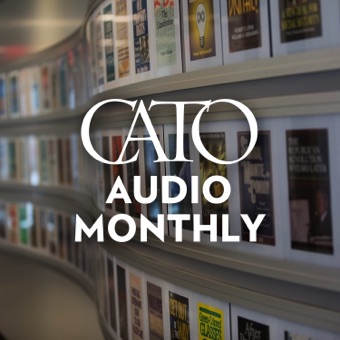 Cato Audio
Cato Audio
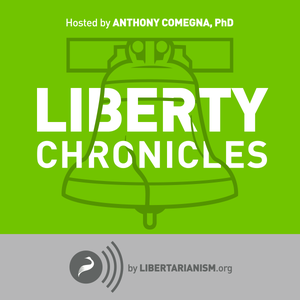 Liberty Chronicles
Liberty Chronicles
 Power Problems
Power Problems
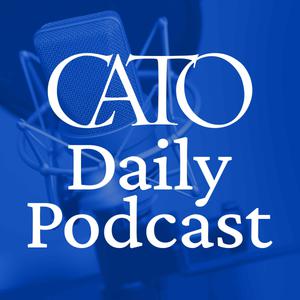 Cato Daily Podcast
Cato Daily Podcast
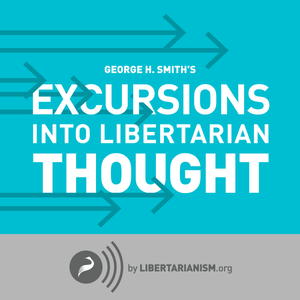 Excursions into Libertarian Thought
Excursions into Libertarian Thought
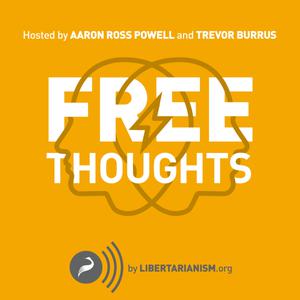 Free Thoughts
Free Thoughts